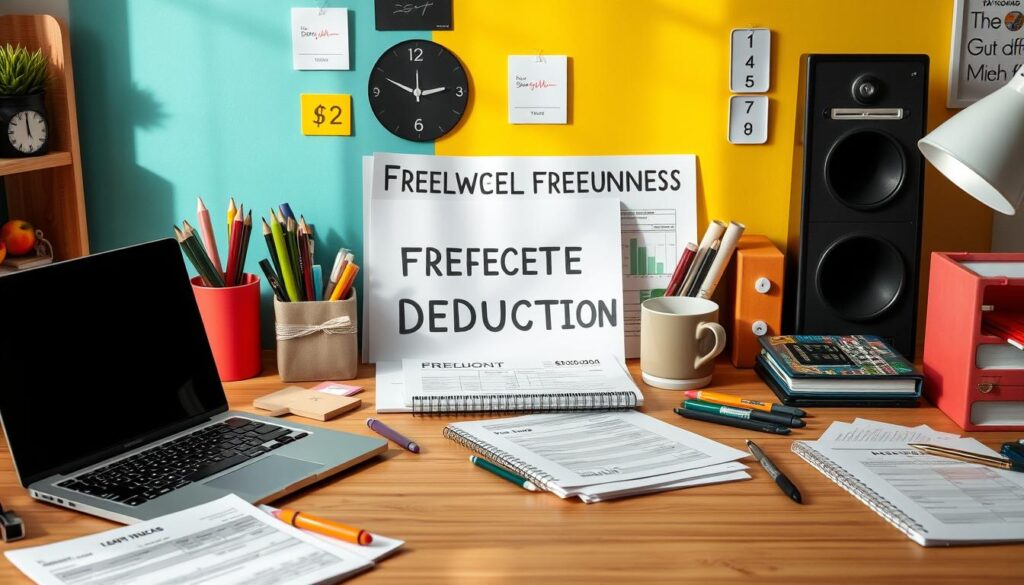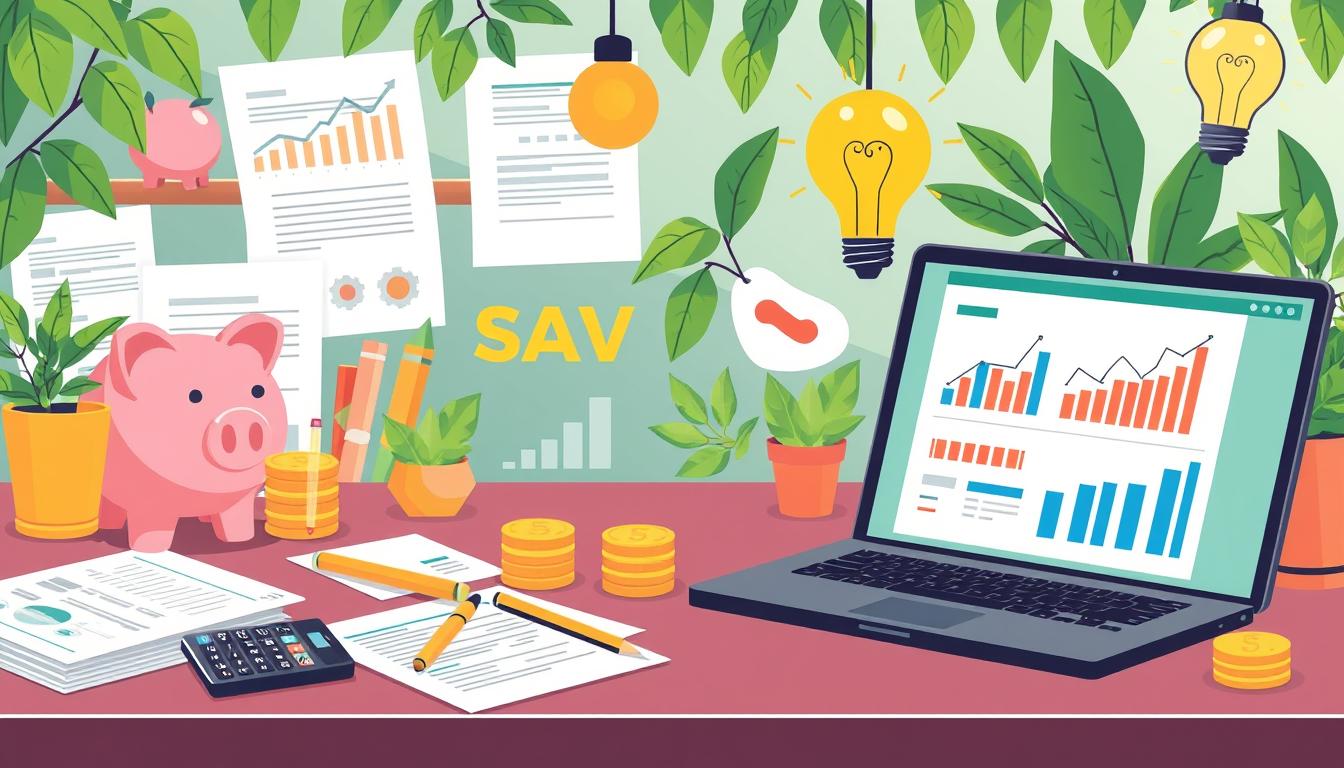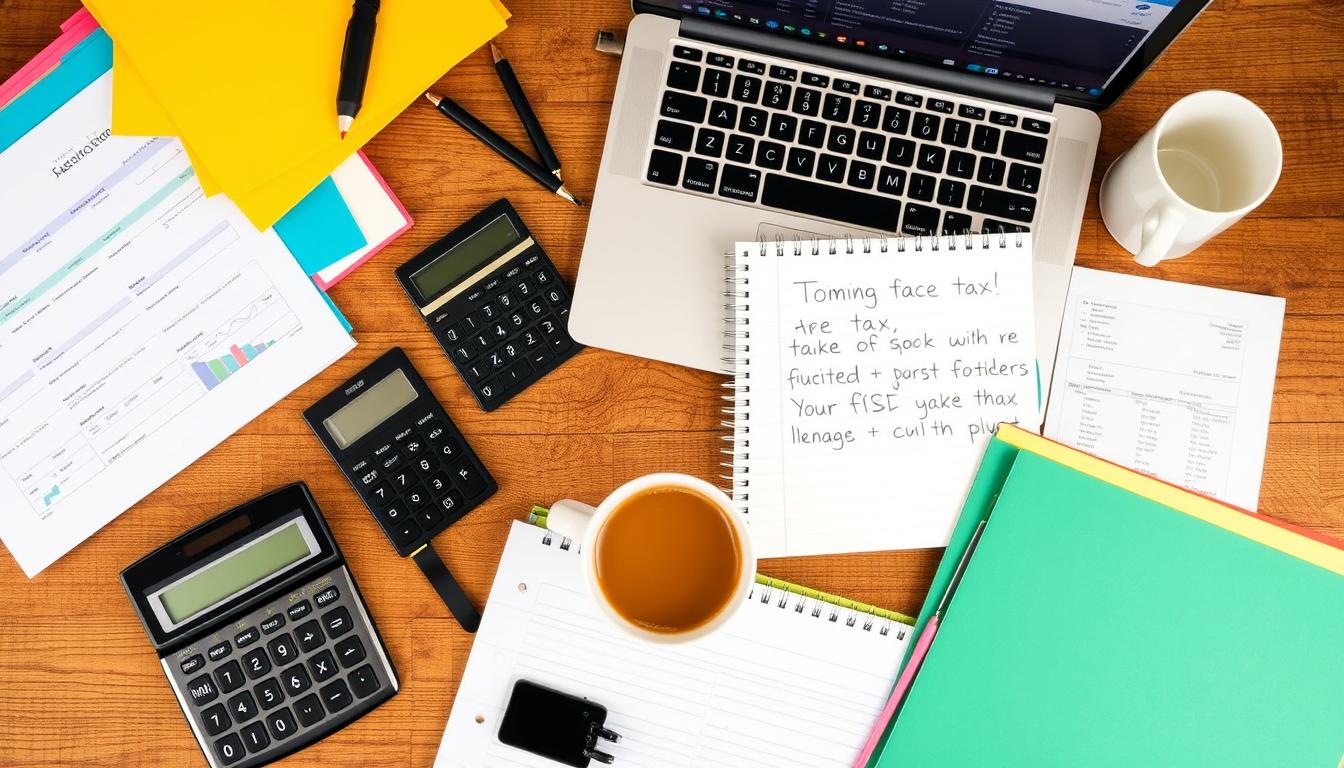Did you know the average American drops a whopping $1,812 yearly on impulse buys? This huge number shows how important it is to spend wisely. It also shows why you need to make the most of tax savings by planning ahead and making smart moves1. By using tax-friendly savings accounts like Individual Retirement Accounts (IRAs), Health Savings Accounts (HSAs), and Solo 401(k) plans, you can cut down your taxable income. This means you keep more of the money you’ve worked so hard for2. Our guide is here to give you key tax strategies to help you enjoy more financial freedom. It’ll walk you through different deductions and credits that are out there specifically for workers like Locum Tenens3.
Key Takeaways
- Engaging in careful financial management can reduce unnecessary spending.
- Utilizing tax-advantaged accounts can enhance your savings and reduce taxable income.
- Tax deductions available to Freelancers and Locum Tenens include home office expenses and travel costs.
- Impulse buying habits can dramatically affect your overall financial health.
- Investing in tax strategies now prepares you for a more secure financial future.
- Staying organized can lead to better tax advantages and improved budgeting.
Understanding Tax Basics for Maximum Savings
Learning about taxes is the first step towards financial health. Knowing the basics helps you deal with tax laws better. It’s all about understanding your taxable income, tax brackets, and deductions.
This knowledge lets you make smart choices. Choices that can greatly reduce how much tax you pay. For example, tax credits can lower your tax bill significantly. If your tax bill is $2,000 and you get a $500 credit, you only pay $1,5004. Tax credits like the Child Tax Credit and the Earned Income Tax Credit can cut down what you owe.
Then there are tax deductions, which reduce your taxable income. For those making more money, a $10,000 deduction could slash taxes by $4,0005. Remember, some deductions have limits, such as the SALT deduction. This might push families to itemize deductions.
Smart deduction strategies can save even more. Switching between standard and itemized deductions could save someone with a 40% tax rate an extra $11,200 over four years5. Always knowing the rules for credits and deductions can really influence your tax game plan.
Stay Organized: The Path to Financial Freedom
Being organized is key to reaching your money goals. Keeping good records helps you handle your money well. This way, your tax info stays correct and fresh. This is really important for those like Locum Tenens. They need to carefully note things like travel costs and medical supplies.
Importance of Record Keeping
Good record keeping makes filing taxes easier. It also lets you make smart decisions all year. By tracking your income and spending carefully, you avoid rushing at the last minute. This ensures you use all your tax deductions well. Studies suggest that people who organize their finances tend to manage their money better. This helps them budget and spend wisely6.
Using Technology for Expense Tracking
Using tech can really help you keep track of spending. Apps help you sort your money matters easily. This leads to better record keeping and insight into how you spend. For example, the Clever Fox budget planner does it all. It helps with budgeting, organizing bills, and tracking expenses6. By using these tools, you can keep tax paperwork neat while still focusing on important tasks.

Embrace Retirement Plans: Securing Your Future
On your path to financial steadiness, knowing about retirement plans is key. Solo 401(k) and SEP IRA stand out for self-employed folks. They bring tax advantages and help you grow your retirement savings.
Solo 401(k) for Locum Tenens
For locum tenens, the Solo 401(k) is a top choice. It lets you put away money, cutting down your taxes. This boosts your future savings. And if you’re 50+, you can add more money to your fund.
Plus, some plans match what you contribute, adding to your savings7.
Benefits of a SEP IRA
The SEP IRA works well for the self-employed. It lets you save a lot for retirement, lowering your taxes. It’s a smart way to save now and strengthen your future. Keeping your contributions in line with your goals is important8.

| Features | Solo 401(k) | SEP IRA |
|---|---|---|
| Eligibility | Self-employed individuals | Business owners and self-employed |
| Contribution Limits | $22,500 (or $30,000 if over 50) + 25% of income | Up to 25% of income, max $66,000 |
| Tax Benefits | Contributions reduce taxable income | Contributions reduce taxable income |
| Catch-Up Contributions | Yes (for age 50+) | No |
Choosing a smart retirement plan is crucial for the self-employed. Getting to know both Solo 401(k) and SEP IRA is a big step towards a safe financial future78.
Home is Where the Deduction Is
If you work from home, you might know about the home office deduction. This deduction can lower your taxes by reducing your taxable income. It’s important to understand the rules for claiming the home office deduction. Knowing what counts for a workspace deduction can save you lots of money on taxes.
Deducting Home Office Expenses
The home office deduction lets you write off certain costs of your workspace. This is especially helpful for people who work remotely. You can deduct expenses related to your home office, like utilities and depreciation. If you run your business from home, keeping detailed records of expenses is key. By understanding IRS rules, you can make sure you get the maximum benefit without breaking any laws. This is important for qualifying your workspace and keeping the right documents9.
Qualifying Workspaces
Not all home workspaces can get deductions, so knowing IRS rules is crucial. To get the home office deduction, you must use the space only for work and often for client meetings. Figuring out how much of your home is used for work helps you know what costs you can deduct. Expenses like mortgage interest, utilities, and insurance can often be written off based on this percentage. Keeping good financial records is important for tax time and dealing with audits1011.

Seek Expert Advice: Partnering with Tax Professionals
Tax planning is tough, so the help of tax experts is crucial. They give you advice that fits your unique needs. This means you can find deductions you didn’t know about, improving your finances.
Importance of Specialized Tax Advice
For real estate investors, expert tax advice is key as the year ends. Research shows only about 10% plan their taxes early enough12. Advice from pros can help you make smart moves, like adding to your retirement funds. This can cut down on how much tax you owe a lot.
By talking to tax pros, you can decide which retirement account is best for you. They can show you how to use plans like 401(k)s to get big tax deductions, up to $66,00012. They look at your income and business to find the best tax savers for you.
How to Choose a Tax Professional
Finding the right tax advisor means you could save more on taxes and have less stress. Start by looking for someone with experience that matches your financial life. It’s important to ask them about their qualifications and how they plan for taxes. You should also see if they’re up-to-date on tax laws.
A good tax advisor will explore every way to save you money13. They’ll help you invest wisely and understand your taxes, especially if you pay taxes quarterly14. Looking for an advisor early gives you more savings and peace of mind.

Maximize Deductions: Explore Commonly Overlooked Options
Many people don’t know about the overlooked tax deductions that can lower your tax liabilities. For example, for cash donations made in 2024, you can subtract up to $300, or $600 if you’re filing with someone else15. Plus, if you live in a state with sales tax, you might opt to deduct that instead of state income tax. This deduction is subject to a $10,000 cap15. Knowing which expenses you can write off helps you get the most out of your deductions.
If your out-of-pocket medical costs exceed 7.5% of your income, you can deduct them15. Homeowners can reduce taxable income through mortgage interest deductions on homes bought for under $750,000 after mid-December 201715. Also, contributing to health savings accounts (HSAs) allows a $4,150 deduction in 202415. Using these accounts can cut down your taxable income and aid in paying for eligible medical costs16.
For professionals, especially therapists, many deductions are often missed. You can write off expenses like utility bills, office materials, computers, or other tech costs17. Even spending on professional development or industry seminars could save you money on taxes17. Keeping track of these expenses ensures every dollar spent might save you a dollar on taxes next time.

Consider Timing: Boosting Your Tax Refund Potential
Knowing when to make contributions can really boost your tax refund. Making smart moves with contributions and purchases before the year ends can help a lot. This can lead to a bigger refund when tax time comes.
End-of-Year Contributions
Making contributions before the year ends can lower what you owe in taxes. You can put money into traditional IRAs up until the deadline for tax filing. This can reduce your taxable income18. Also, changing your withholding with Form W-4 can give you more cash each month. This can also make your tax refund bigger19.
If you’re looking for a bigger refund, consider having more tax taken out of each paycheck. You do this through line 4(c) of Form W-4. It can mean a bigger refund at the end of the year if you plan it right19.
Strategic Purchases Before Year-End
Making smart buying decisions can also help with taxes. Try to buy things that can be deducted, like business gear, before the year’s out. This can make your tax refund bigger20. Planning for expenses like your mortgage or giving to charity before the year ends can also help. It can really make a difference in your deductions and lead to a bigger tax refund20.
| Type of Contribution/Purchase | Potential Benefits | Impact on Tax Refund |
|---|---|---|
| Traditional IRA Contribution | Taxable income reduction | Higher refund based on contribution limit |
| Increased Withholding (Form W-4) | Distributed refund potential | Adjusted cash flow with larger end-of-year refund |
| Business Equipment Purchase | Immediate tax deduction eligibility | Increased refund through qualifying expenses |

Remember, smart timing with your contributions and buys can really pay off.192018
Rethink Your Filing Status for Optimal Tax Benefits
Your filing status greatly affects your tax savings. If you know the difference between married filing jointly and married filing separately, you can plan better for savings. For example, a couple’s strategy in 2013 led to only $150 in tax on a $150,000 income21.
By using smart tax strategies for married couples, you can save more. One strategy let families get a $3,000 Child Tax Credit for three kids in 201321. Knowing your filing status can majorly cut down your taxes. Without a plan, a couple’s taxes could jump a lot21.
Deeply looking at your situation helps you pick the best filing status. Someone made $77,750 in 2013, but after adjustments, their taxable income was way less21. This shows how choosing wisely can be beneficial.
| Filing Status | Taxable Income | Potential Benefits |
|---|---|---|
| Married Filing Jointly | Lower taxable rate | Access to credits and deductions increased |
| Married Filing Separately | Potentially higher tax | Limits some tax credits |
| Head of Household | Lower than married rates | Higher standard deduction |

Talking with others who have made similar choices can give you useful tips. Online talks show different views can help understand and use tax strategies well22.
Utilize Health Savings Accounts (HSAs)
Health Savings Accounts (HSAs) offer a way to save money on taxes while paying for health care. It’s essential to know if you qualify for an HSA and understand the rules. HSAs have triple tax advantages: tax-free contributions, tax-free withdrawals for qualified health expenses, and tax-free growth on earned interest23.
Eligibility Criteria for HSAs
To put money into an HSA, you need to have a high-deductible health plan (HDHP). The basics for an HDHP include having a minimum deductible of $1,400 for one person and $2,800 for a family24. For 2024, you can contribute up to $4,150 for one person and $8,300 for a family. People 55 and older can add another $1,00025.
Tax Advantages of HSAs
If you invest your HSA money instead of spending it on medical bills, it could grow a lot over time. On average, HSA investments grow about 7% in 30 years23. You can use the money in your HSA to pay yourself back for old medical bills without paying taxes25. Putting money into an HSA can also lower your taxes. For example, a $3,400 deposit might save you $816 if you’re in the 24% tax bracket24.

When you turn 65, you can use your HSA money for things other than medical expenses without facing penalties, almost like a retirement account25. But, only about 10% of people are investing their HSA money, missing out on chances for tax-free growth25. Using HSAs smartly can improve your financial situation and help you deal with health care costs better.
Tax Credits: Uncovering Hidden Savings
Tax credits are key to getting some extra money back. The Earned Income Tax Credit (EITC) is especially good for families with lower incomes. It helps them get back a significant amount of money. Are you earning an income that qualifies? You might get tax benefits to improve your finances.
Understanding the Earned Income Tax Credit
The Earned Income Tax Credit really helps many families. It can boost tax refunds by up to 12%. To get it, your income and family size matter. You need to research carefully. Knowing how to apply can help you make the most of your taxes.
Child Tax Credit Eligibility
The Child Tax Credit can lower how much tax you pay if you have kids. Families with kids 17 or younger can get this credit, and it might give some taxpayers a refund. It’s important to know if you’re eligible. This way, you can save more money for your family.

Plan for Tax Season: Strategies for Success
Preparing for tax season is all about being organized all year. Prioritize keeping track of deductions to make filing easier. This helps avoid missing any deductions.
Documenting Deductions Throughout the Year
Keeping good records helps you get all your deductions and makes end-of-year taxes simpler. Save records of charity donations, educational expenses, and other deductible items. You need to keep these records for at least three years or more if you face tax issues26.

Use spreadsheets or tax software to keep your documents in order. By doing this, you can easily track your financial moves and deductions. It’s smart to organize your deductions for quick access later.
Preparing for Changes in Tax Laws
Staying current with tax law changes is key to good tax planning. Changes in deductions and credits can affect what you owe. Knowing about standard deductions, which depend on your filing status, is important. In 2023, the standard deduction is $13,850 for singles and $27,700 for married couples filing together26.
Understanding these changes helps you plan your finances better. Always use trustworthy sources or talk to professionals to understand tax rules. With careful documentation and up-to-date knowledge, you’ll make the most of tax benefits and increase your refund.
The Ultimate Tax Hack to Keep More Money in Your Pocket!
To really save on taxes, mix deductions with credits to up your refund. Knowing how to use different tax breaks together helps save more and prepares you for tax season. Some taxpayers miss out on special deductions. For instance, Locum Tenens workers can deduct travel costs, medical supplies, and education costs needed for their job3.
Combining Deductions and Credits
The Child Tax Credit offers $2,000 per child for those who qualify, helping your deductions20. You can also include up to $6,000 of expenses for the Child and Dependent Care Credit, enhancing your financial state20. These credits directly reduce how much tax you owe, freeing up more money for you.
Year-Round Tax Planning
Planning your taxes all year helps you make smart money moves, increasing your savings. It’s key to know about all the deductions you can get, like for home office costs, reducing what you owe3. Getting advice from tax pros in your area can reveal more savings and create plans just for you3. With changing tax laws, being strategic keeps you prepared to take advantage of every tax break you can.

Become Tax Credit Savvy: Know Your Options
Understanding various tax credit options can lead to big financial benefits during tax time. These credits lower how much tax you owe and can help businesses27. By using all the credits you can, you save money and boost your financial health.
The Saver’s Credit is key for many. It lets single filers using traditional IRAs and 401(k)s qualify for up to $2,00028. The child and dependent care credit is also vital for families, offering 20% to 35% of allowable expenses. You could get back up to $3,000 for one child or $6,000 for two28. These credits are crucial for getting the most out of your tax return.
Keeping accurate records is important for claiming these benefits27. Also, health savings accounts (HSAs) offer a tax-friendly way to save for health costs. This can add to your savings28.
Look into various options, like the Simplified Home Office Deduction for self-employed folks29. By learning and using the right tax credits, you open up opportunities for savings. This ensures you get every financial benefit possible.

Maximize Your IRA Contributions: A Smart Move
Maximizing your IRA contributions is crucial for a better financial future. You must choose between a Roth IRA and a Traditional IRA. Each has key differences. Contributions to 401(k)s and Traditional IRAs are pre-tax. Roth IRA contributions use after-tax dollars. This affects your taxes now and later30. Knowing these Traditional IRA differences helps in making choices that fit your retirement goals.
Traditional vs. Roth Contributions
Contributing to a Traditional IRA lowers your taxable income now. But, you’ll pay taxes when you take money out during retirement. Roth IRA contributions don’t give a tax break right away. Instead, they let your money grow tax-free for later31.
If your tax rate is lower now than you think it will be when you retire, consider a Roth IRA. It’s also essential to understand how capital gains tax affects you. There’s a 0% tax rate for those within certain income brackets. This might change how you invest.
Catch-Up Contributions for Older Taxpayers
If you’re 50 or older, catch-up contributions are a chance to save more. In 2023, you can add a significant extra amount to your savings. It’s crucial to use these options to boost your retirement savings and lower tax liabilities. Remember, taking money out early from a traditional IRA or 401(k) before age 59 means a 10% penalty plus taxes32.
By carefully selecting IRA contributions and using catch-up options, you’re building a stronger financial future.

Diving Deep into Business Deductions for Freelancers
As a freelancer, you can really save on taxes using different deductions. It’s key to know which expenses you can write off to keep more cash with you.

Vehicle costs are a big area for deductions. For 2024, you can deduct 67 cents per mile for business driving33. Keeping track of your miles means more savings, especially if you often meet clients or go to events.
Business meals have rules for deductions. From 2023, only half of your meal costs during work meetings can be deducted. This is a change from the previous years when 100% was deductible if you ate at a restaurant33. Knowing these rules is key for filing your taxes right.
In California, business folks like Anthony and Mark know that smart tax moves matter. Anthony saves more money because he uses good tax strategies34. A guide called “Pay Less Taxes: How To Legally Reduce Your Taxes By Up To 40%” reveals some great tips34.
Employing your child in your business is a smart move for tax savings. This can help you to not pay as much in higher tax brackets. It’s a smart way to use tax rules to your benefit34.
It’s crucial to have a good financial team. A bookkeeper, tax advisor, and banker can lower your taxes and boost your overall earnings34. Learn about the deductions that the IRS watches closely, like the home office claim. With the right paperwork, you can save legally.
Charity and Tax: A Financial Win-Win
Giving to charities helps the community and can also offer tax benefits. If you donate stock instead of cash, your impact is greater. Donors giving stocks often contribute far more than those who give cash. The typical cash donation is about $20035. This approach allows you to dodge high capital gains taxes, up to 20%. You also get to deduct the stock’s full market value35.
Learning about IRS rules can improve your financial planning. The IRS caps stock donation deductions at 30% of your adjusted gross income (AGI). If you donate more, you can carry it forward for five years35. Donating stock can also lower your future tax on profits35. This not only aids your taxes now but also helps meet your future financial goals by making your investment portfolio better35.
Services like Subsplash Giving make it easier to donate. They support many payment options, including stock. This makes it simple to help charities you like35. With the correct paperwork, you could deduct 20% to 60% of your AGI for these donations36.
Considering future taxes, charitable giving is a smart move. The Tax Cuts and Jobs Act of 2017 says estate tax exemptions will drop by 202637. Including charitable giving in your planning can lower your future taxes. Tax-loss harvesting lets you offset up to $3,000 of losses against income. This can boost your finances while you support your community37.

Conclusion
To sum up this complete guide, remember that making the most of tax benefits is ongoing. It’s a key part of achieving financial freedom. The tips shared here are powerful tools for better tax savings. They help you manage your taxable income and make the most of deductions you can use.
Learning about specific deductions is beneficial, especially for Locum Tenens roles. These include travel and home office expenses. Tools like Solo 401(k)s and SEP IRAs make it easier to save on taxes. This can really help grow your wealth over time338.
Also, getting advice from tax professionals can reveal deductions you might not know about. Documenting these well can increase your savings. With careful planning and effective strategies, you’re not just doing taxes. You’re in charge of your financial future, paving the way for lasting success39.
FAQ
What is the best way to track my work-related expenses?
How can a Solo 401(k) benefit me as a self-employed individual?
What are the requirements for claiming a home office deduction?
How do I choose the right tax professional for my situation?
What are some commonly overlooked deductions I might be missing?
Why is timing important when it comes to tax contributions?
Can Health Savings Accounts (HSAs) provide tax benefits?
What is the Earned Income Tax Credit, and who qualifies for it?
How can I prepare for potential changes in tax laws?
What are catch-up contributions, and who can use them?
Source Links
- 6 Best Money Hacks of 2024 – https://www.ramseysolutions.com/budgeting/money-hacks?srsltid=AfmBOoq1A8qLcbRb85QpAQpE9rsrYdWJ2kTRt-Damj6-zfgX5EXDmZ9X
- Keep More of Your Money: Tax-Advantaged Savings Hacks for Freelancers – https://blog.joinfud.com/p/keep-more-of-your-money-tax-advantaged-savings-hacks-for-freelancers
- Tax Hacks for Locum Tenens: Keep More Money in Your Pocket – https://www.linkedin.com/pulse/tax-hacks-locum-tenens-keep-more-money-your-pocket
- Tax Credits vs. Tax Deductions: What You Need to Know – https://www.accountantsnow.com/post/tax-credits-vs-tax-deductions-what-you-need-to-know
- 5 Tax Deductions for High Earners (plus a Tax Hack) – The Physician Philosopher – https://thephysicianphilosopher.com/tax-deductions-high-earner/
- Tips and tricks for saving extra money in 2023 – https://www.castlegarnews.com/savvy-shopper/tips-and-tricks-for-saving-extra-money-in-2023-7138780
- 7 Surprising Hacks for Boosting Retirement Savings – Westmont Living – https://westmontliving.com/blog/westmont-of-carmel-valley/assisted-living/7-surprising-hacks-for-boosting-retirement-savings/
- Secure Your Financial Future – Top Ways by UAG – https://unitedadvisersgroup.com/top-way-to-secure-your-financial-future/
- House Hacking & Taxes (the Implications You Need to Know) – https://www.biggerpockets.com/blog/house-hacking-taxes
- One Valuable Tax Hack (You Didn’t Think Of) – https://www.sixfiguresunder.com/timing-deductions-tax-hack/
- Shockingly Common Tax Deductions You Didn’t Know Existed – https://www.accountantsnow.com/post/shockingly-common-tax-deductions-you-didnt-know-existed
- What You Need to Do NOW to Pay Fewer Taxes in 2024 – https://www.biggerpockets.com/blog/real-estate-846
- How to Save Money: 23 Ways to Start Today – https://www.ramseysolutions.com/budgeting/the-secret-to-saving-money?srsltid=AfmBOorcU0d_y2YTK7JuOJhhHExZYJRdgT-_wQ1N3QUVQOI-pUKLRimz
- Smart Money Podcast: Taxes for the Self-Employed – Avoid Common Tax Mistakes and Navigate Freelancer Finances – NerdWallet – https://www.nerdwallet.com/article/finance/smart-money-podcast-taxes-for-the-self-employed-avoid-common-tax-mistakes-and-navigate-freelancer-finances
- 5 Most Overlooked Tax Deductions – https://www.investopedia.com/articles/tax/09/overlooked-tax-deductions.asp
- 5 Powerful Hacks to Maximize Tax Savings in the USA & CANADA – https://theaccountingandtax.com/5-powerful-hacks-to-maximize-tax-savings-in-the-usa-canada/
- A Complete Guide to Tax Deductions for Therapists – intakeQ Blog – https://blog.intakeq.com/complete-guide-tax-deductions-for-therapists/
- 5 smart ways to increase your tax refund – https://www.cbsnews.com/news/smart-ways-increase-tax-refund/
- Fatten Your Paycheck and Still Get a Tax Refund – https://turbotax.intuit.com/tax-tips/tax-refund/fatten-your-paycheck-and-still-get-a-tax-refund/L5HaySdDP
- 5 Hidden Ways to Boost Your Tax Refund – https://turbotax.intuit.com/tax-tips/tax-refund/5-hidden-ways-to-boost-your-tax-refund/L0AZGnJuS
- $150,000 Income, $150 Income Tax – Root of Good – https://rootofgood.com/make-six-figure-income-pay-no-tax/
- IRS tests free e-filing system that could compete with tax prep giants – https://news.ycombinator.com/item?id=35950836
- 4 HSA Hacks to Supercharge Your Wealth – The Retirement Nerds – https://theretirementnerds.com/4-hsa-hacks-to-supercharge-your-wealth/
- How I Used My HSA Last-Minute to Save $900 in Taxes This Year — Millennial Money with Katie – https://moneywithkatie.com/blog/how-i-used-my-hsa-last-minute-to-save-900-dollars-in-taxes
- Unlock the power of your Health Savings Account (HSA): 5 hidden benefits you need to know | Facet – https://facet.com/unlock-the-power-of-your-health-savings-account-hsa-5-hidden-benefits-you-need-to-know/
- Tax Planning: 7 Tax Strategies to Consider – NerdWallet – https://www.nerdwallet.com/article/taxes/tax-planning
- Savvy Tax Hacks for Entrepreneurs: Expert Strategies to Maximize Returns – https://www.accountantsnow.com/post/savvy-tax-hacks-for-entrepreneurs-expert-strategies-to-maximize-returns
- 10 Most-Overlooked Tax Deductions and Credits – https://www.kiplinger.com/taxes/602075/most-overlooked-tax-breaks-and-deductions
- 15 Powerful Self-Employed Tax Tips | Porte Brown – https://www.portebrown.com/newsblog-archive/self-employed-tax-tips
- Tax-Efficient Investing: Keep More of Your Money – NerdWallet – https://www.nerdwallet.com/article/investing/tax-efficient-investing
- 5 Tax-Saving Hacks Retirees Must Know Before the End of 2023 | The Motley Fool – https://www.fool.com/retirement/2023/12/09/5-tax-saving-hacks-retirees-must-know-before-the-e/
- Top 5 Hacks To Maximize Retirement Savings – https://www.biggerpockets.com/blog/top-5-hacks-maximize-retirement-savings
- Top 22 1099 Tax Deductions (And a Free Tool to Find Your Write-Offs) – https://www.keepertax.com/freelancer-tax-deductions
- 4 Proven Ways to Pay Less Taxes – https://wp-staging.wealthfit.com/articles/4-proven-ways-to-pay-less-taxes/
- 5 benefits of donating stock to charity – https://www.subsplash.com/blog/donating-stock-to-charity
- How to Reduce Your Tax Bill: 12 Tips and Tricks – NerdWallet – https://www.nerdwallet.com/article/taxes/tips-save-taxes
- 9 Tax Tips That Could Save You Money on Your Taxes – https://www.ml.com/articles/tax-tips-that-could-save-you-money.html
- 4 Best Real Estate Tax Hacks for Residential Investors – https://www.lifetimetaxadvisors.com/best-real-estate-tax-hacks-investors/
- How To Maximize Your Tax Deductions As A Notary Public – https://www.loansigningsystem.com/how-to-maximize-tax-deductions-as-a-notary-public.html









